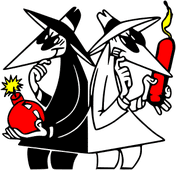|
This obfuscating etymological conundrum has a fascinating back story. In the Middle Ages, when English was really starting to develop, many people were arguing about the color that fire left. Some said it was white, because of the way the ashes glowed as the fire was still burning, but others said it was black, because of the hue left in the soot. Germanic speakers certainly couldn't figure this out, so they got the best of both worlds in one word, which happened to be blac (or something similar- no one's quite sure). This word referred to both the present-day colors of white and black at the same time, and was the source of great confusion. When everyone got annoyed with puzzling over what meant what, they divvied it up so that the French got blanc (meaning white) and the English got black (meaning black) and bleach (meaning white). Afterwards, the English modified the French word blanc to make it blank, since the color white was at that point associated with nothingness, and modified their own word of bleach to create bleak.
1 Comment
HonHon Baguette
11/7/2016 01:53:16 pm
Blanc
Reply
Leave a Reply. |
AUTHORHello! I'm Adam Aleksic. I have a linguistics degree from Harvard University, where I co-founded the Harvard Undergraduate Linguistics Society and wrote my thesis on Serbo-Croatian language policy. In addition to etymology, I also really enjoy traveling, trivia, philosophy, board games, conlanging, and art history.
Archives
December 2023
TAGS |



